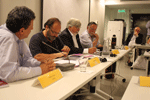Social Watch News
Published on Tue, 2014-04-08 14:56
“Partnerships” for sustainable development are increasingly being promoted as a major, if not the primary, enabler for the implementation of the successor international sustainable development goals to replace the Millennium Development Goals (MDGs) by 2015. However, a growing number of civil society groups warn against a partnerships approach that places primary emphasis on enticing private sector participation and investments as this risks reinforcing the corporate capture of the post-2015 agenda. This one-and-a-half hour Public Forum seeks to provide critical perspectives on the major issues and challenges associated with partnerships with the “private sector” for sustainable development. |
|
Published on Fri, 2014-04-04 10:44
» |
Published on Fri, 2014-04-04 10:40
Alternatives to austerity programs do exist, conclude civil society organizations and networks from around the world that met in Montevideo, convened by Social Watch to discuss strategies to face the multiple global crises. In the opening of our debates, the Uruguayan ministers of Interior, Eduardo Bonomi, of Labour, José Bayardi, and of Social Development, Daniel Olesker explained the way in which they managed to eradicate extreme poverty, reduce inequalities and grow at the same time. See the video here. (To see the English subtitles, press on the CC at the bottom right of the video). |
Published on Thu, 2014-04-03 17:37
In a panel discussion held in Dhaka Reporters’ Unity Mr. Roberto Bissio, the Coordinator of Social Watch, a global civil society alliance working in more than hundred countries, said that the enforcement for human rights and addressing inequalities should be the main concern in setting post 2015 development agenda. The panel discussion titled “Post 2015 Development Agenda: Future Global Development Partnership” organized by EquityBD, Social Watch Bangladesh and Unnayan Samunnay. The panel discussion is moderated by Rezaul Karim Chowdhury of EquityBD and other speakers of the session are Ahmed Swapan of VOICE, Aminur Rasul of Unnayan Dhara Trust, Prodip K Roy of Online Knowledge Society, Dr Sohel Iqbal, Badrul Alam of Bangladesh Krishok Federation (BKF) and Barkat Ullah Maruf of EquityBD. |
Published on Wed, 2014-04-02 18:30
On April 3-4 2014 the Intergovernmental Committee of Experts on Financing Sustainable Development holds a consultation on the theme “Co-Creating New Partnerships for Financing Sustainable Development,” in the city of Helsinki, Finland. This committee was established by the outcome document of the United Nations Conference on Sustainable Development called for the establishment of an intergovernmental committee of experts on financing for sustainable development tasked with preparing a report “proposing options on an effective sustainable development financing strategy to facilitate the mobilization of resources and their effective use in achieving sustainable development objectives.” In a statement for the occasion, Righting Finance said that “In view of the systemic market failures of the past decade, we are convinced now more than ever of the need for an effective and capable government as a protector and guarantor of human rights in development rather than a mere enabler of private sector development.” |
| Source: . Published on Wed, 2014-04-02 00:00 |
| Source: . Published on Wed, 2014-04-02 00:00 |
| Source: . Published on Wed, 2014-04-02 00:00 |
| Source: . Published on Tue, 2014-04-01 00:00 |
|
Published on Fri, 2014-03-28 00:00
» |
SUSCRIBE TO OUR NEWSLETTER










